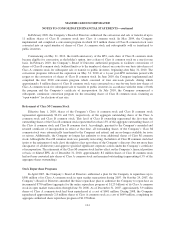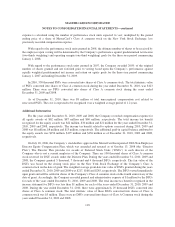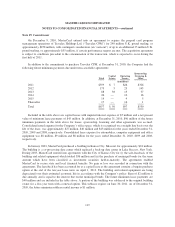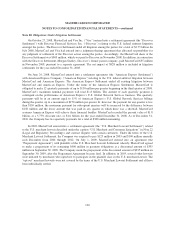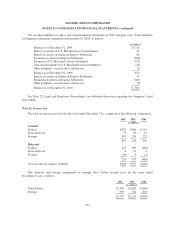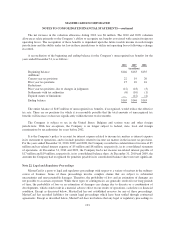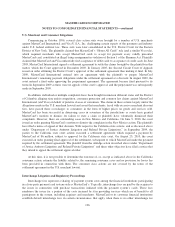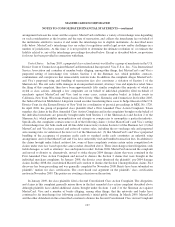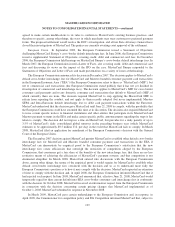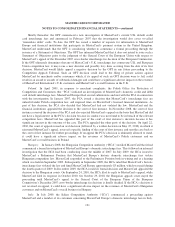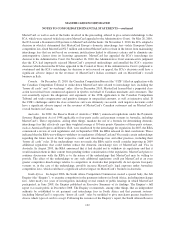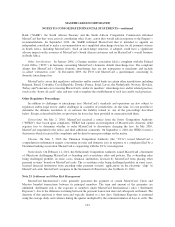MasterCard 2010 Annual Report Download - page 134
Download and view the complete annual report
Please find page 134 of the 2010 MasterCard annual report below. You can navigate through the pages in the report by either clicking on the pages listed below, or by using the keyword search tool below to find specific information within the annual report.MASTERCARD INCORPORATED
NOTES TO CONSOLIDATED FINANCIAL STATEMENTS—continued
which it is a party would have a material impact on its results of operations, financial position, or cash flows.
Although MasterCard believes that it has strong defenses for the pending litigations and regulatory proceedings
described below, it could in the future incur judgments and/or fines, enter into settlements of claims or be
required to change its business practices in ways that could have a material adverse effect on its results of
operations, financial position or cash flows. Notwithstanding MasterCard’s belief, in the event it were found
liable in a large class-action lawsuit or on the basis of a claim entitling the plaintiff to treble damages or under
which it were jointly and severally liable, charges it may be required to record could be significant and could
materially and adversely affect its results of operations, cash flow and financial condition, or, in certain
circumstances, even cause MasterCard to become insolvent. Moreover, an adverse outcome in a regulatory
proceeding could result in fines and/or lead to the filing of civil damage claims and possibly result in damage
awards in amounts that could be significant and could materially and adversely affect the Company’s results of
operations, cash flows and financial condition.
Department of Justice Antitrust Litigation and Related Private Litigations
In October 1998, the U.S. Department of Justice (“DOJ”) filed suit against MasterCard International, Visa
U.S.A., Inc. and Visa International Corp. in the U.S. District Court for the Southern District of New York
alleging that both MasterCard’s and Visa’s governance structure and policies violated U.S. federal antitrust laws.
First, the DOJ claimed that “dual governance”—the situation where a financial institution has a representative on
the Board of Directors of MasterCard or Visa while a portion of its card portfolio is issued under the brand of the
other association—was anti-competitive and acted to limit innovation within the payment card industry. Second,
the DOJ challenged MasterCard’s Competitive Programs Policy (“CPP”) and a Visa bylaw provision that
prohibited financial institutions participating in the respective associations from issuing competing proprietary
payment cards (such as American Express or Discover). The DOJ alleged that MasterCard’s CPP and Visa’s
bylaw provision acted to restrain competition.
In October 2001, District Court Judge Barbara Jones issued an opinion upholding the legality and
pro-competitive nature of dual governance. However, the judge also held that MasterCard’s CPP and the Visa
bylaw constituted unlawful restraints of trade under the federal antitrust laws. In November 2001, the judge
issued a final judgment that ordered MasterCard to repeal the CPP insofar as it applies to issuers and enjoined
MasterCard from enacting or enforcing any bylaw, rule, policy or practice that prohibits its issuers from issuing
general purpose credit or debit cards in the United States on any other general purpose card network. The Second
Circuit upheld the final judgment and the Supreme Court denied certiorari.
Shortly after the Supreme Court’s denial of certiorari, both American Express and Discover Financial
Services, Inc. filed complaints against MasterCard and Visa in which they alleged that the implementation and
enforcement of MasterCard’s CPP and Visa’s bylaw provision violated U.S. federal antitrust laws. In June 2008,
MasterCard entered into a settlement agreement with American Express to resolve all current litigation between
American Express and MasterCard. Under the terms of the settlement agreement, MasterCard is obligated to
make twelve quarterly payments of up to $150 million per quarter with the first payment having been made in
September 2008. See Note 20 (Obligations under Litigation Settlements) for additional discussion. In October
2008, MasterCard and Visa entered into a settlement agreement with Discover (the “Discover Settlement”),
ending all litigation between the parties for a total of approximately $2.8 billion. The MasterCard share of the
settlement, paid to Discover in November 2008, was approximately $863 million. In addition, in connection with
the Discover Settlement and pursuant to a separate agreement, Morgan Stanley, Discover’s former parent
company, paid MasterCard $35 million in November 2008.
124


